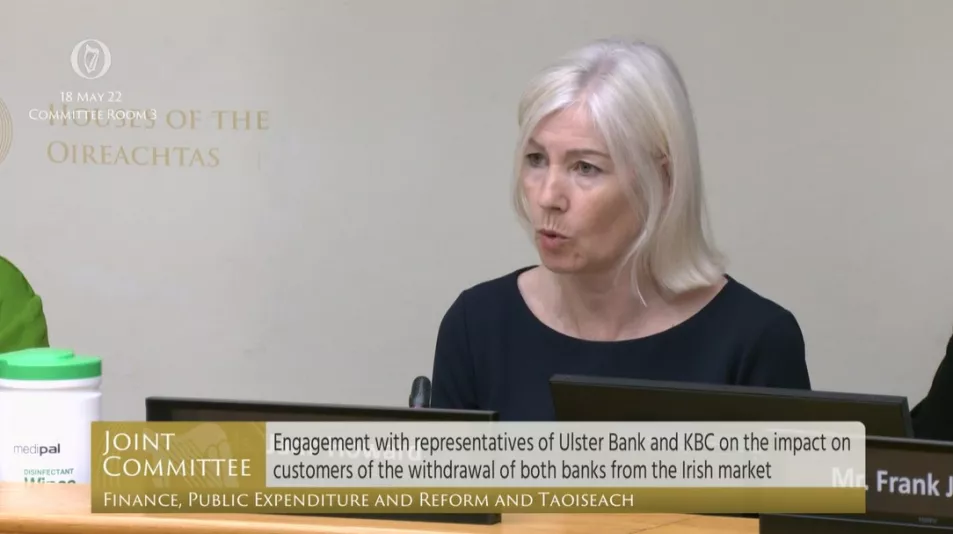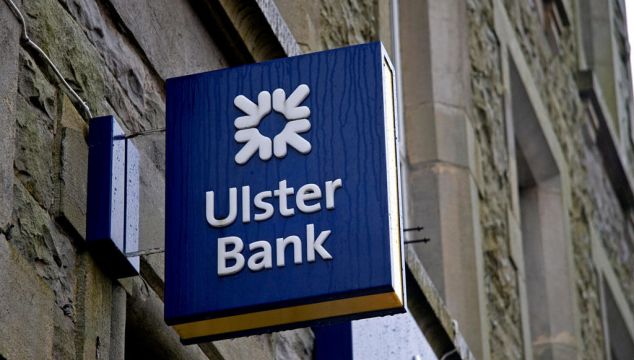A TD has expressed concerns at the Oireachtas Finance Committee that not all Ulster Bank customers may be notified about switching their bank account before the end of September.
Ulster Bank and KBC Bank announced last year that they plan to leave the Irish market, affecting hundreds of thousands of people and businesses in Ireland.
There are 985,000 active and inactive Ulster Bank accounts in Ireland.
Ulster Bank chief executive Jane Howard told the committee that around 20,000 letters a week are being sent out to its customers to notify them that they will need to switch their account.

The bank will send out letters until the end of September, and customers will be given six months’ notice to switch to a different bank, Ms Howard said.
Customers do not need to take any action until they receive their formal letter, Ms Howard said in her opening statement.
After customers receive their initial letter, they will also be prompted at various times over the six-month notice period through texts, the mobile app, follow-up letters, emails, and calls.
Customers who do not switch their account after six months will have any residual funds left in their account sent in a cheque 30 days after the six-month notice period.
Sinn Féin finance spokesperson Pearse Doherty estimated that 80,000 letters a month amounted to around 320,000 letters being sent out between now and the end of September.
This is in addition to 120,000 letters already issued by Ulster Bank from April 13th to date, the vast majority of which belong to personal account holders.
“That means half your customers will get a letter from you?” the Donegal TD asked.
Ms Howard clarified that some customers have both a deposit account and a current account.

The 70,000 business account holders may also have personal accounts, and there are 255,000 inactive Ulster Bank accounts.
“But even on those figures, there’s a quarter of a million people you’re saying in your schedule that might not get a letter if you’re only issuing 80,000 letters a month,” Mr Doherty said.
Ms Howard said everybody would be contacted, and committed to sharing the schedule for the issuing of letters with the committee.
Frank Jansen, chief executive and executive director of KBC Bank Ireland, told the committee it would be “flexible” in accommodating customers as the bank withdraws from the market.
He said every customer will receive six months’ notice of account closure, and from June 1st formal closure notices will begin to be sent out to customers on a phased basis until early 2023.
“Of the 52,000 accounts that will need to move to a new provider, less than 100 are categorised as vulnerable customers and they will be separated from the general customer group and provided with a bespoke engagement strategy,” he told the committee.
Ulster Bank has contacted 30,000 older customers with a direct call from its local branch team, the committee heard.
Elizabeth Arnett, Ulster Bank director of corporate affairs, said the bank is aiming to understand what is “the most effective trigger” to encourage a customer to switch their bank account, with brochures and an online hub among the mediums used to contact and inform customers.

In the second part of the committee, Mr Doherty told representatives of AIB, Bank of Ireland, and Permanent TSB that, as bad as the withdrawal of the two banks is for consumers, “this is Christmas all rolled into one” for the other banks.
The banking representatives were asked by committee members what supports are being made available for new customers.
Peter Farrell, of retail banking at Permanent TSB, said new customers can apply online for an overdraft and upload documents online to support their application, but the bank would still have to carry out a credit assessment by their new provider to regain features such as overdrafts.
In response to questions from Dublin Bay South TD Jim O’Callaghan, Mr Farrell said this credit assessment would be similar to those carried out by Ulster Bank and KBC Bank.
Jim O’Keeffe, of AIB, said if customers face financial difficulty, AIB has a “core competence” to manage that, thanks to legacy issues from the financial crash.
For older staff, AIB staff have completed “thousands of hours of training” to support them, he said.
Brian Nuget, head of consumer banking at AIB, said there are now 800 staff in its call centres, an increase on previous numbers brought about due to the pandemic and a rise in fraud complaints.
Gavin Kelly, chief executive of the retail division of Bank of Ireland, said 50 per cent of consumers receive their new account number on the same day they open their account.
He also said resources are being added to meet consumers at their homes, and as there are “quite a number” of small business accounts at Ulster Bank, additional resources have been increased to help business owners switch their accounts.
Mr Kelly said it was “a key” and “unprecedented” time for the banking industry in Ireland.







